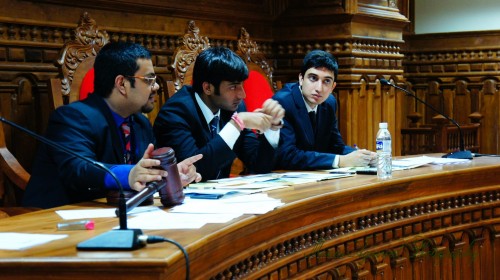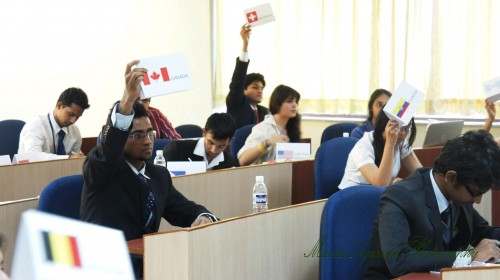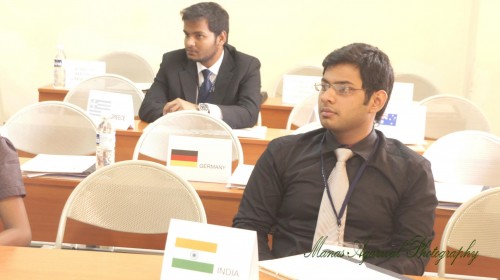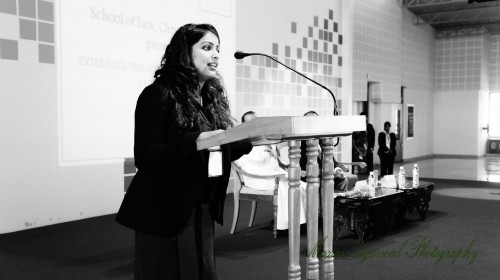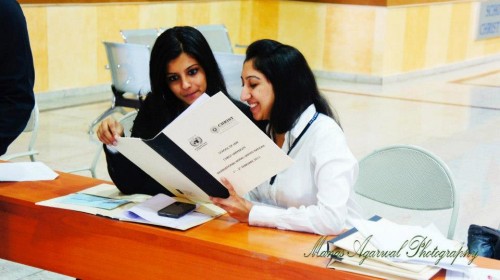The pictures in this article are courtesy of Manas Agarwal, a student at the School of Law, Christ University.
The inaugural edition of the School of Law, Christ University International Model United Nations Conference (SLCU MUN) 2013 was held from February 1st to 3rd at Christ University’s School of Law, one of India’s premier law schools. In its first edition, SLCU MUN hosted more than 100 delegates from across India and Lebanon. The executive board was made up of students from various higher education institutions around India as well as Christ University students. This conference featured traditional United Nations committees such as the General Assembly and Human Rights Council, and specialized committees which included the Historic Security Council, the Emergency Economic Council and the International Court of Arbitration, which was simulated for the first time in the country.
The General Assembly discussed the Situation in the Middle East, and covered the many dimensions of the subject area such as the nuclear situation in Iran, the situation in Syria, the Israeli-Palestine conflict among many others over the course of the conference. Well-researched delegates strongly debated this issue, constructed multiple solution-based resolutions and defused crises thrown at them.
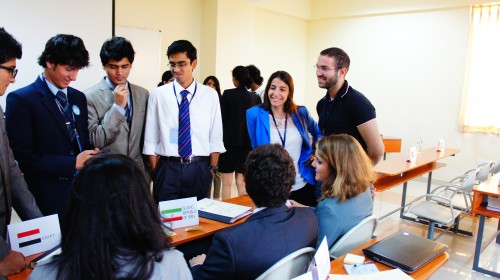
Chairperson Ariya Das interacts with the delegates of the General Assembly during an unmoderated caucus
The Human Rights Council discussed Xenophobia, and had a high-level of debate and passed one of the most detailed resolutions that I have ever seen. The crisis involving the detention of Indian Muslims in Switzerland was resolved in a very diplomatic manner. Participation was even throughout the committee, and delegates worked collaboratively with each other.
The precarious Iran Hostage Crisis was discussed in the Historic Security Council. The council was comprised of delegates who were well versed with the topic, and saw a high level of debate (with the occasional tussle between Iran and the United States of America). Despite having a relatively low number of delegates, the council responded well to the incoming crises and finally managed to pass a resolution.
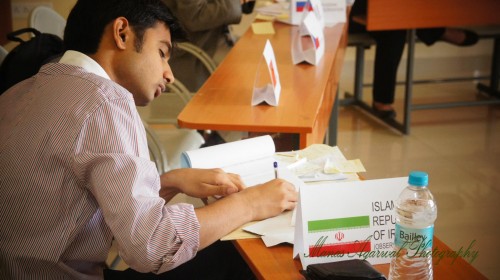
The delegate of the Islamic Republic of Iran writing a right to reply to the United States of America
The Emergency Economic Council (EEC) was a committee set in the near future when the US economy is on the verge of collapse, which has led to a domino effect on the other economies of the world. The council debated economic matters such as changing the Global Reserve Currency, austerity vs. stimulus and external debt. The technical nature of the committee required that the delegates research extensively on different economic terms and theories. Being a continuous crisis committee, delegates in the EEC were constantly given updates on the changes in the world economies, which maintained dynamism in the committee and actively engaged the delegates.
The International Court of Arbitration (ICA) was simulated in the conference with a slightly modified moot court procedure where the different participants took turns in role playing the claimant or defendant and the judge. This simulation took place in the Christ University’s School of Law’s special moot court room. Participation in this committee was reserved exclusively for law students, and the executive board members were law students too. The cases discussed all regarding disputes over international commercial law and were adopted from old ICA cases, but were slightly modified to avoid having participants recognize them.
SLCU MUN’s crown-jewel lies with its innovative approach to committees with the simulation of the ICA. It marks a change in the Indian Model UN circuit as this conference takes a step in moving away from the traditional simulations of UN committees that characterize Indian Model UN conferences, but maintains the educational dimension in Model UN. Unlike a normal moot court competition, participants were able to give a judgement to the cases, and there was an award for the best judge.
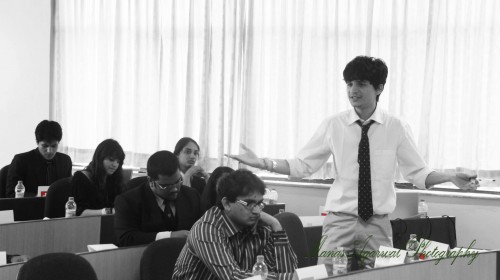
Historic Security Council President Zahaan Khan steps into the Human Rights Council as a guest delegate
SLCU MUN’s success is defined by the quality of debate it had as well as the positive responses from the delegates. The integration of the International Court of Arbitration in Model UN conferences is another point of success. The cultural night was also well received by the delegates, and helped delegates forge friendships with each other. With the success of the first edition, SLCU MUN has established itself as an important conference in the South Indian Model UN circuit.
Congratulations to all the award winners! Thank you to Convenor Ankita Brigit, Secretary-General Vibha Vasuki and the entire organizing committee of SLCU MUN 2013 for having me visit. Well done on hosting a successful conference!

